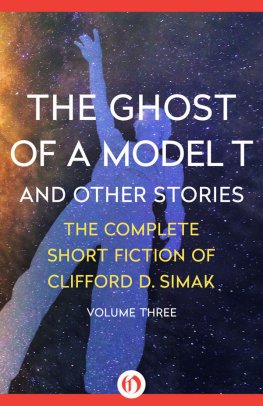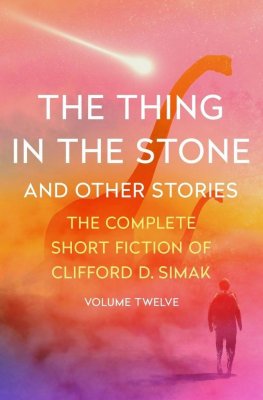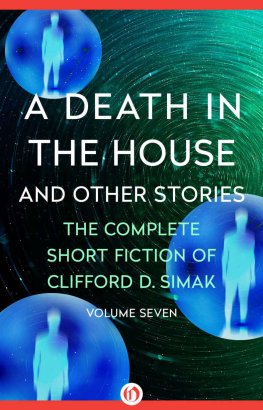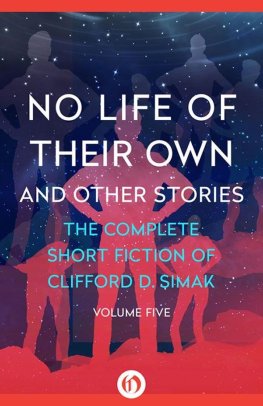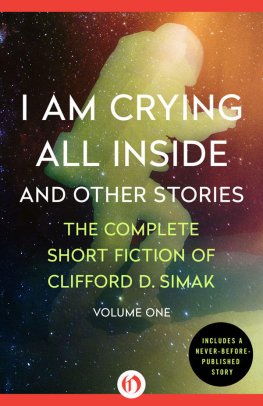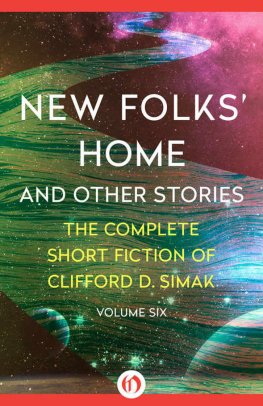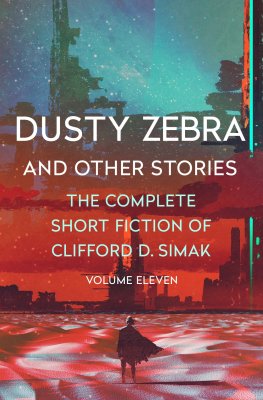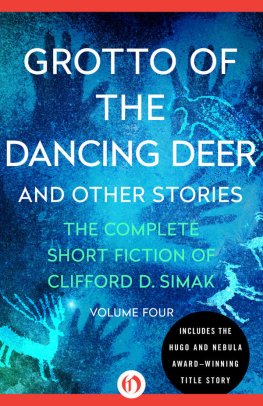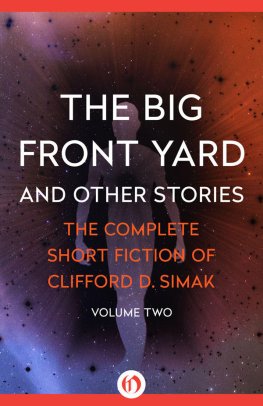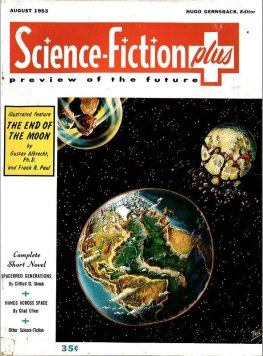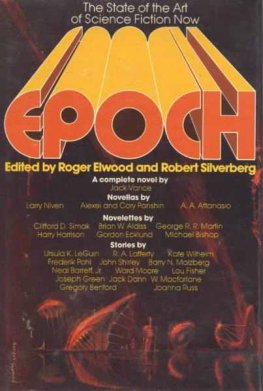The Ghost of a Model T
And Other Stories
The Complete Short Fiction of Clifford D. Simak, Volume Three
Clifford D. Simak and City: The Seal of Greatness
by David W. Wixon
It would have been different, he thought, if we could have stayed on Earth, for there we would have had normal human contacts. We would not have thought so much, or brooded; we could have rubbed away the guilt on the hides of other people.
Clifford D. Simak, in Shadow ShowIn this, the third volume of Clifford D. Simaks collected short fiction, you find the story City, reprinted in its original magazine version.
If there is a single work for which Clifford D. Simak is most known, it is the book City. Most people call City a novel, but it is actually a compilation of eight short stories laced together by interstitial materials to form a work that functions as a novel. And since those eight stories were all once published individually, they are included as such in this volume.
Simak fans of a purist disposition may be pleased to know, however, that this collection features the original magazine versions of the stories from City. Most of them were altered, to various extents, for the book, which was put together some years later. But this volume preserves the original versions, heretofore unavailable.
As it happens, the earlier stories were not projected to be part of any series. Desertion, which appears as the fourth episode in City, was actually written before any of the others: Cliffs journals show that it had been sold to John W. Campbell Jr. (who would publish the story in Astounding), before City itself was sent to him. This lends credence to the theory that Desertion was inserted into the series after the fact to provide a basis for the following story, Paradise.
The City stories, in their compiled form, demonstrate Clifford D. Simaks passage from apprenticeship to craftsman as a writer. His own words confirm that transition: From that time on, for the most part, I was in control of my writing efforts rather than floundering around, trying to find myself as a writer.
Yet, he added, there was still much that I had to learn. And later, speaking of a time when he reread the City volume in its entirety, he said: I ached to rewrite the tales. But that, he continued, was unrealistic: The ache to rewrite was a gut reactiona sadness that in the 40s I had not done as good a writing job as I could have done in the 70s. I realized, however, that those stories could only have been written in the 40s, that in the 70s I would have been incapable of writing them. In the intervening years I undoubtedly had become a better writer, but I had lost something in the process.
Thus, the author who wrote the version of City in this volume might be described as a different man, and a different writer, than the author who would pen his later works. But I sincerely hope that he is still someone you would like to know.
David W. Wixon
This story was originally published in the April 1958 issue of Infinity Science Fiction; and Cliffs fragmented journals give a slightly better view of how the story developed than is usually the case: only four days passed between the time (in May 1957) he first mentioned that he was working on the Stamp story, to his referring to it as Spore, then finally to his use of the name Leg.Forst. The story went quickly for him, which I suspect came about at least in part because of its subject matter. Cliff actually commented, within days of having begun to write it, that it was a Better story than I thought it was.
And it is a charming little story. But you, average reader, might not fully understand thatnot unless you (like Cliff and like myself) are a stamp collector, too.
The term Leg.Forst. represents a clever counterfeit of the sort of term familiar to collectors serious enough to have spent time perusing the various stamp-collecting catalogs and journals. And Clyde Packers views about the avocation, which so puzzled those who came into contact with him, were clearly written by someone all too familiar with both the way collectors were viewed by others (with opinions starting at gentle amusement and quickly deteriorating), and the way collectors refuse to be affected by such opinions. (In Cliffs defense, let me hastily add that he was not the same sort of deep-down, driven stamp collector as Clyde Packer: Cliff, aware of the difference, called himself a stamp accumulator, not a stamp collector.)
dwwWhen it was time for the postman to have come and gone, old Clyde Packer quit working on his stamps and went into the bathroom to comb his snow-white hair and beard. It was an everlasting bother, but there was no way out of it. Hed be sure to meet some of his neighbors going down and coming back and they were a snoopy lot. He felt sure that they talked about him; not that he cared, of course. And the Widow Foshay, just across the hall, was the worst one of them all.
Before going out, he opened a drawer in the big desk in the middle of the cluttered living room, upon the top of which was piled an indescribable array of litter, and found the tiny box from Unuk al Hay. From the box he took a pinch of leaf and tucked it in his cheek.
He stood for a moment, with the drawer still open, and savored the fullsome satisfaction of the taste within his mouthnot quite like peppermint, nor like whiskey, either, but with some taste akin to both and with some other tang that belonged entirely to itself. It was nothing like another man had ever tasted and he suspected that it might be habit-forming, although PugAlNash had never informed him that it was.
Perhaps, he told himself, even if Pug should so try to inform him, he could not make it out, for the Unukians idea of how Earths language should be written, and the grammar thereof, was a wonder to behold and could only be believed by someone who had tried to decipher one of his flowery little notes.
The box, he saw, was nearly empty, and he hoped that the queer, faithful, almost wistful little correspondent would not fail him now. But there was, he told himself, no reason to believe he would; PugAlNash, in a dozen years, had not failed him yet. Regularly another tiny box of leaf arrived when the last one was quite finished, accompanied by a friendly noteand all franked with the newest stamps from Unuk.
Never a day too soon, nor a day too late, but exactly on the dot when the last of the leaf was finished. As if PugAlNash might know, by some form of intelligence quite unknown to Earth, when his friend on Earth ran out of the leaf.
A solid sort, Clyde Packer told himself. Not humanoid, naturally, but a very solid sort.
And he wondered once again what Pug might actually be like. He always had thought of him as little, but he had no idea, of course, whether he was small or large or what form his body took. Unuk was one of those planets where it was impossible for an Earthman to go, and contact and commerce with the planet had been accomplished, as was the case on so many other worlds, by an intermediary people.
And he wondered, too, what Pug did with the cigars that he sent him in exchange for the little boxes of leafeat them, smoke them, smell them, roll in them or rub them in his hair? If he had hair, of course.
He shook his head and closed the door and went out into the hall, being doubly sure that his door was locked behind him. He would not put it past his neighbors, especially the Widow Foshay, to sneak in behind his back.
The hall was empty and he was glad of that. He rang almost stealthily for the lift, hoping that his luck would hold.

